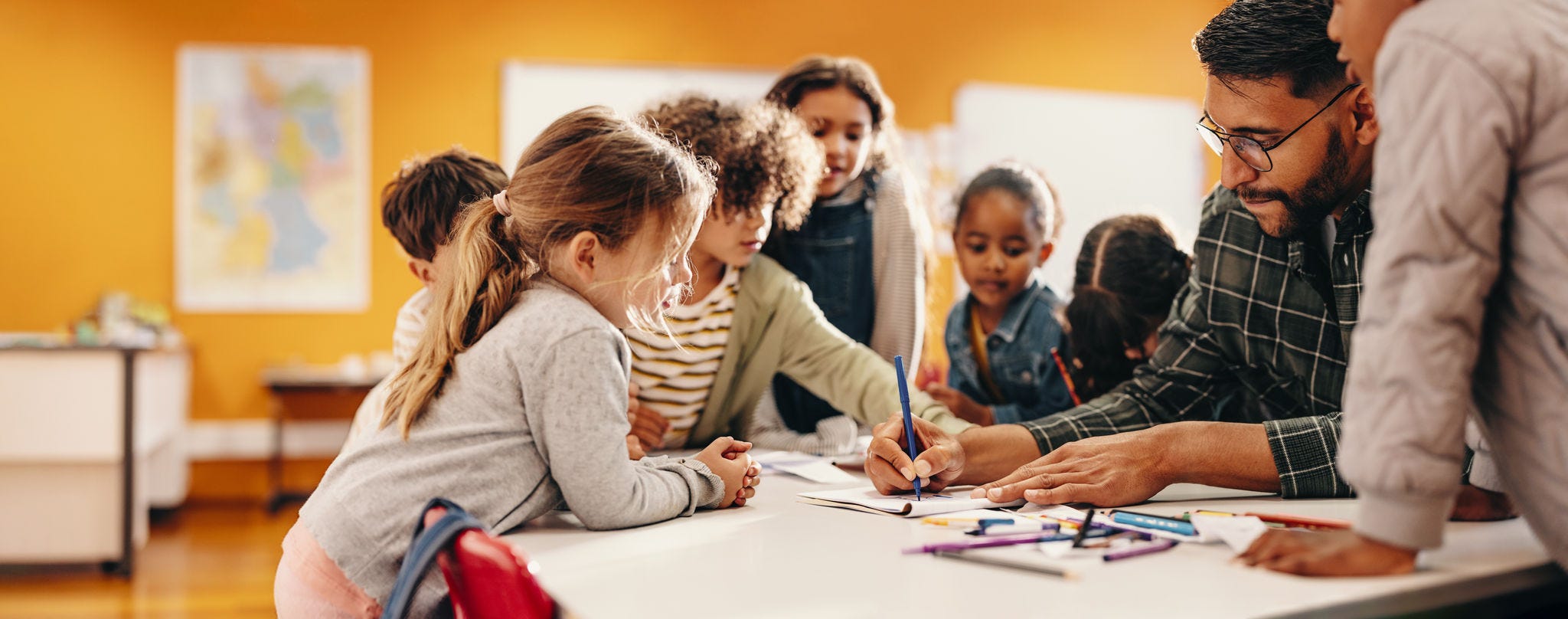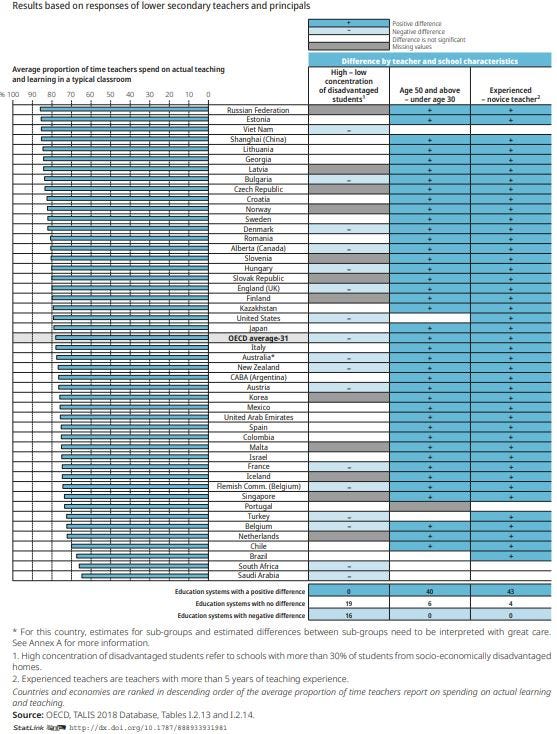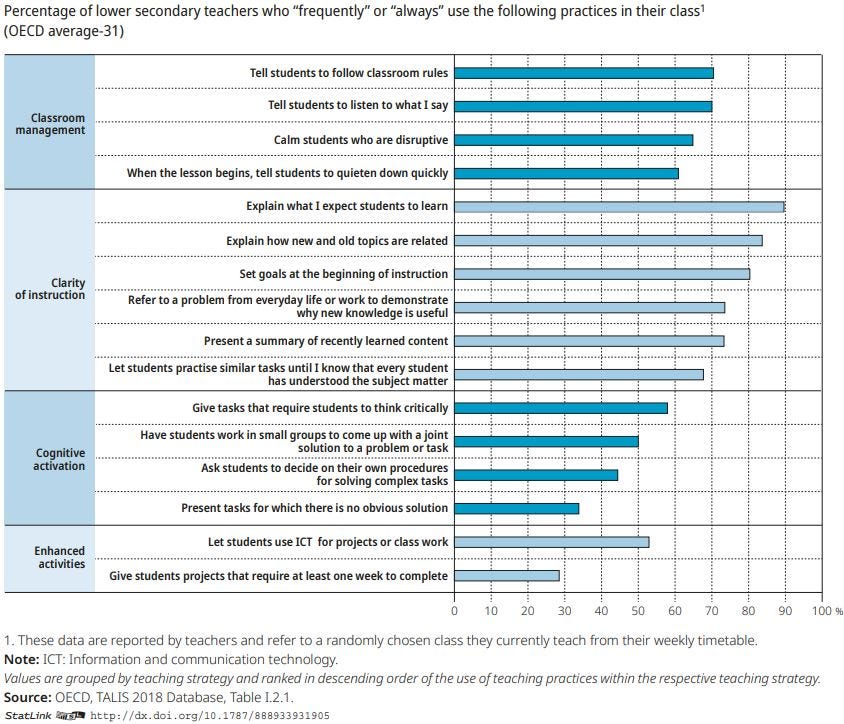An important pre-condition for implementing quality teaching practices is maximising time in the classroom. According to TALIS 2018, teachers report spending 78% of classroom time on teaching and learning, on average across the OECD, 13% on maintaining order and 8% on administrative tasks. There has been an overall decline in classroom time spent on actual teaching and learning since 2008 in roughly half the countries surveyed. This underlines the importance of supporting teachers – especially those new to the profession – in classroom management. Indeed, TALIS data indicate that older and more experienced teachers tend to achieve a higher share of classroom time spent on teaching and learning activities.
Teacher practices
Effective classroom teaching is central to the work of teachers and crucial for student learning. It is important to develop policies that help understand and support effective teaching practices.

Key messages
While everyone agrees on the need to promote high-quality teaching, instruction is complex and the debate on what constitutes good practice is far from resolved. There are two clearly defined orientations in education philosophies and empirical research: direct instruction and constructivism, and it is safe to say that virtually all teachers rely on both approaches at some point in their teaching, moving between the two depending on context and needs. TALIS 2018 data have revealed that during a typical lesson, practices centred on managing the class and ensuring clarity of instruction are widely applied in OECD countries. In contrast, practices involving student cognitive activation are less prevalent despite their significant potential to enhance student learning. This highlights the need for greater efforts to mainstream high-impact practices.
Schools appear to be recognising the value of innovative teaching to respond to the challenges of the 21st century. According to TALIS 2018 data, the vast majority of teachers say that their schools are open to innovative practices and have the capacity to adopt them. However, teachers in Europe and millennial teachers are less likely to report such openness to innovation. Moreover, the effectiveness of any teaching practice depends on how teachers implement it in the classroom. School-level practices that help teachers work together to improve student learning and that transform the school into a professional learning community have received great attention as a way to spread and foster the use of innovative practices.
Context
Use of classroom time
On average across the OECD, teachers report spending 78% of classroom time on actual teaching and learning, with the remaining classroom time spent on keeping order (13%) and administrative tasks (8%).
Time spent on actual teaching and learning, by teacher and school characteristics (2018)

Teaching practices
In 2018, on average across OECD countries and economies, almost all teachers frequently use practices pertaining to clarity of instruction. Cognitive activation practices seem to be less widespread.
Teaching practices (2018)

Related publications
Programmes and projects
-
TALIS - the Teaching and Learning International Survey - is the world's largest international survey about teachers and school leaders.Learn more
-
Meeting the challenges of the 21st Century means that schools must be empowered to play a more central and active role in leading improvements in education. To support this, Schools+ will bring together major education networks to put schools at the centre of education design.Learn more
-
Add a short description – maximum 200 characters (4 lines). This should outline the OECD’s mandate and the main issues/challenges with respect to the project. Writing style and tone should be clear, to the point, and jargon-free.Learn more
-
PISA is the OECD's Programme for International Student Assessment. PISA measures 15-year-olds’ ability to use their reading, mathematics and science knowledge and skills to meet real-life challenges.Learn more
-
Artificial Intelligence (AI) and robotics are becoming increasingly sophisticated at replicating human skills. The evolution of these technologies could fundamentally transform work over coming decades and deeply affect education’s current role in providing skills and preparing learners for future work.Learn more
-
The Centre for Educational Research and Innovation (CERI) provides and promotes international comparative research, innovation and key indicators, explores forward-looking and innovative approaches to education and learning, and facilitates bridges between educational research, innovation and policy development.Learn more
-
The Education Policy Outlook is an analytical observatory that monitors the evolution of policy priorities and policy developments from early childhood education to adult education, mainly among OECD education systems, to provide a comparative understanding of how policies are evolving, and how they can be best implemented or improved over time.Learn more
-
The OECD’s programme on education and skills policy support policymakers in their efforts to achieve high-quality lifelong learning, which in turn contributes to personal development, sustainable economic growth, and social cohesion.Learn more
-
Education for Inclusive Societies Project is designed to respond to the increasing diversity that characterises education systems, and seeks to help governments and relevant stakeholders achieve more equitable and inclusive education systems as a pillar to create more inclusive societies.Learn more
-
OECD Future of Education and Skills 2030 aims to build a common understanding of the knowledge, skills, attitudes and values students need in the 21st century.Learn more
-
The OECD Indicators of Education Systems (INES) programme seeks to gauge the performance of national education systems through internationally comparable data.Learn more
-
The PISA-based Test for Schools provides school-level estimates of performance and information about the learning environment and students’ attitudes gathered from student questionnaires. Find out more and how schools and their networks can take part.Learn more
-
Since 2013, the OECD has gathered evidence on how school resource policies work in different contexts. The focus is now on digital resources to enable countries to learn from each other in the digital transformation of their education.Learn more
-
Large-scale assessments of social and emotional skills mainly use students’ self-assessments, which have some flaws in terms of comparability and, to some extend, validity and interpretability. Smaller studies are trialling more direct assessments of these skills. Work is needed to translate the innovations made in these trials and test them on larger, international scales. » A better understanding of social and emotional skills will lead to better inclusion of these skills in education.Learn more
-
Data and digital technologies are among the most powerful drivers of innovation in education, offering a broad range of opportunities for system and school management, as well as for teaching and learning. But they also create new policy issues as countries face challenges to reap the benefits of digitalisation in education while minimising its risks.Learn more
-
The Starting Strong Teaching and Learning International Survey (TALIS Starting Strong) is an international, large-scale survey of staff and leaders in early childhood education and care (ECEC).Learn more
-
Across the OECD, enormous investment and effort has aimed to reinforce the quality, production and use of education research in policy and practice. Despite this, strengthening the impact of research in education policy making and practice remains a challenge for many systems.Learn more
-
The OECD Survey on Social and Emotional Skills is an international survey that identifies and assesses the conditions and practices that foster or hinder the development of social and emotional skills for 10- and 15-year-old students.Learn more
-
The Teacher Knowledge Survey (TKS) examines what teachers know about teaching and learning, and how their specialised knowledge of pedagogy relates to their work and training.Learn more
-
Creativity and critical thinking prepare students for innovative economies and improve wellbeing. However, educators often lack guidance on how to equip students with creativity and critical thinking within subject teaching. Education systems have likewise rarely established ways to systematically assess students’ acquisition of creativity and critical thinking.Learn more






